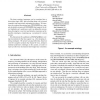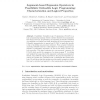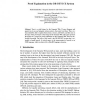409 search results - page 9 / 82 » Semantics for a theory of defeasible reasoning |
DEXAW
2002
IEEE
14 years 13 days ago
2002
IEEE
The latest ontology languages can be translated into a description logic (DL), thus providing them with a formal semantics and associated reasoning procedures. We introduce the or...
COMMA
2008
13 years 9 months ago
2008
Abstract. The identification of consistent sets of arguments is one of the most important concerns in the development of computational models of argument. Such extensions drive the...
ECSQARU
2005
Springer
14 years 1 months ago
2005
Springer
Possibilistic Defeasible Logic Programming (P-DeLP) is a logic programming language which combines features from argumentation theory and logic programming, incorporating as well t...
RR
2007
Springer
14 years 1 months ago
2007
Springer
Trust is a vital feature for the Semantic Web: If users (humans and agents) are to use and integrate system answers, they must trust them. Thus, systems should be able to explain t...
JAIR
2012
11 years 10 months ago
2012
To achieve scalability of query answering, the developers of Semantic Web applications are often forced to use incomplete OWL 2 reasoners, which fail to derive all answers for at ...



